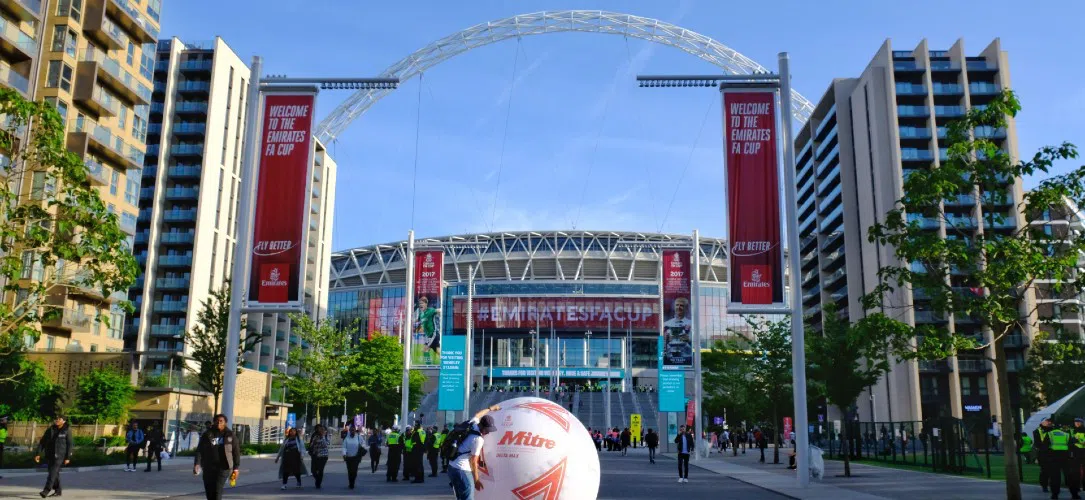Interested to learn more about the FA cup – the oldest football competition in the world? Find out more about the FA Cup format and draw, in our detailed guide.
From identifying the total number of rounds to exploring when different leagues’ teams can enter, and even information on the new FA Cup format for old fans of the tournament, here is everything you need to know about the oldest domestic football competition in the world!
What is the FA Cup?
At over 150 years old, the FA Cup – or the Football Association Challenge Cup – was founded all the way back in 1871. This makes it the oldest and longest-running football competition in history, and has taken place every year with the exception of those seasons that would have occurred during the two World Wars.
Running from August to May, the Cup has gone by many names in its history, and tends to be named based on its current sponsorship. But as of 2015, it’s been known as the Emirates FA Cup – though such name changes have played little role in how the FA Cup is formatted.
How does the FA Cup work?
Unlike table-leagues like the Premier League or Championship, the FA Cup is what’s known as a domestic knockout competition. Played annually in England, it’s open to any club that plays in the English football pyramid.
Due to their competitive status, all clubs playing in the Premier League, EFL Championship, EFL League One, and EFL League Two automatically qualify in the first round or later, while the rest of the clubs battle it out in six qualifying rounds to reach the official rounds of the tournament.
Once these six rounds have been completed, of the 645 teams below League Two, there will be 32 teams remaining who go on to play in the ‘first round proper’, where League One and Two teams are entered. Then, when the official third round is reached, Premier League and Championship sides first-feature.
Eventually, after the official fifth round is completed, the competition will progress to a quarter-final, semi-final, and then a final played at Wembley, to decide the overall winner of the tournament.
The FA Cup rounds explained
If you’ve read the above and you’re still a little unsure about how exactly the FA Cup stages are explained, don’t worry! The FA Cup, after all, is somewhat unique in its design.
How many rounds are in the FA Cup?
In simple terms, the FA Cup is intentionally split into two sets of 6 rounds – the qualifying rounds and the official competition rounds.
The six qualifying rounds happened simultaneously over the first three months of the tournament to filter through the large number of non-league sides that enter the competition, while the official six rounds introduce the Football League teams.
Here is how the breakdown looks from a top-level perspective:
Extra preliminary round – Level 8 clubs (96 lowest ranked), Level 9 clubs, and Level 10 clubs should any vacancies in the fixtures need filling.
Preliminary round – Level 8 clubs (64 highest ranks).
First round (Qu) – Level 7 clubs.
Second round (Qu) – Level 6 clubs.
Third round (Qu) – No clubs added.
Fourth round (Qu) – Level 5 clubs.
Official first round – League One and League Two clubs added.
Official second round – No clubs added
Official third round – Premier League and Championship clubs added.
Official fourth round – No clubs added.
Official fifth round – Regular knockout round.
The finals – Quarter-finals, semi-finals, and finals.
Naturally, being a knockout-only competition, once a team loses a game, they are out – no ifs, ands, or buts. Likewise, a team automatically progresses to the next round should they win their game.
As you can imagine, this can make for some surprising upsets at all stages of the tournament, especially if a well-regarded team don’t have their head in the game – and there have been more than a few surprises in the FA Cup first round from lower level teams making an impact.
How do replays in the FA Cup work
Historically, ‘replays’ have existed throughout the full FA Cup format, whereby in the event that a tie occurs, the sides meet again at a later date. In the replay, a winning result is required; so, should the game still end in a draw after the full 90 minutes, then the tie will be decided by extra time and penalties if need be, in order to have one team move on to the next round.
However, as of the 2024/25 season, the replay rule has changed, to scrap replays from the first round onwards. For the first six qualifying rounds, though, replays are still in place: if a game ends in a draw, a new match date will be set for these teams to have a rematch to determine a winner – usually at the away side’s stadium.
How does the FA Cup draw work?
Due to the specific nature of the FA Cup, and its lack of group stages, all FA Cup fixtures are entirely randomised. None of the entrants are seeded. Instead, all 12 rounds are randomly drawn to determine who will play who – the only exception to this is the final, where there will, obviously, only be two teams playing.
As for the draws themselves, each club will be assigned a number which corresponds to a ball that’s emptied into a glass container. Balls are then picked out one by one, with the person picking unable to see the numbered ball they have picked until it is presented.
Each set of two balls picked out denotes two teams playing each other, with the first ball being the home team and the second ball the away team – so yes, that does mean there’s the potential for an FA Cup team to play all home or all away games!
What is the new FA Cup format?
For any readers already familiar with the FA Cup and how it works, you’ve probably heard of the changes coming into play for the 2024/25 seasons. But for those not in the know, here is a breakdown of the new FA Cup format.
First and foremost, replays will no longer be played after the qualifying rounds end, meaning all matches in the official competition rounds will automatically go to extra time and penalties if a tie can’t be settled in normal time.
Alongside this, all rounds will now be played on weekends, with the fourth, fifth, and quarter-final rounds being exclusive of Premier League fixtures. The fourth round will even have an extended playing window, too, so fans can catch more of the games.
And, to top it all off, the FA Cup Final will now take place on the second to last weekend of the Premier League season, with no Premier League games being played on this Saturday or the Friday night before.
Many of the latest updates to the FA Cup format are intended to strengthen the support of the competition, providing football fans the chance to watch knockout football without the distraction of the Premier League.
How does the FA Cup relate to the European football?
Although the FA Cup does not help a team to qualify for the Champions League, the winner of the FA is automatically awarded a place in the Europa League group stage.
What is the FA Cup schedule?
As it stands each round of the FA Cup is currently played in line with the following months:
Extra preliminary round – August
Preliminary round – August
First round (Qu) – September
Second round (Qu) – September
Third round (Qu) – October
Fourth round (Qu) – October
Official first round – November
Official second round – December
Official third round – January
Official fourth round – February
Official fifth round – March
Quarter-finals – March 29th
Semi-finals – April 26th
The final – May 17th
Which teams have previously won the FA Cup?
Plenty of teams have claimed the title of FA Cup champion over the decades, with many intense FA Cup finals being held in Wembley.
As for recent FA Cup winners, Man United claimed the title in 2024, while Man City lifted the trophy in 2023, and Liverpool in 2022 – and who can forget the phenomenal 1-0 win by Leicester City in 2021 against Chelsea!
However, if we go back all the way to the very first FA Cup, the very first winners were Wanderers FC. Sadly, no longer in existence, the Wanderers nevertheless gave a great showing, then-beating the Royal Engineers 1-0.
But when it comes to FA Cup pedigree, then we need look no further than Arsenal, who have won the most FA Cups overall with 14 wins and appearing in 21 FA Cups in total. And while they last won in 2020, their consistent appearances mean they’re always in the conversation among those debating who’ll claim the next FA Cup victory.
Who is the favourite for this year’s FA Cup final?
The FA Cup has reached the Fifth Round and several of the biggest clubs in England have already been knocked out, meaning the competition is looking more open than ever. Manchester City are the current favourites in the football betting, having last lifted the trophy during their incredible treble-winning 2022/23 season.
They are followed in the market by Aston Villa, who last won the FA Cup in 1957. Other contenders in the betting include Bournemouth, who have never won the cup during their history, and 1983 runners-up Brighton.
England FA Cup Winner 2024-25
Manchester City – /
Aston Villa – /
Brighton – /
Fulham – /
Bournemouth – /
Crystal Palace – /
Nottingham Forest – /
Ipswich Town – /
Preston North End – /
How to bet on the FA Cup
A cornerstone of English football, the FA Cup has been around for many years, and will no doubt continue to be held for decades to come. Even the 2024/25 season is sure to have some serious upsets and surprises, but if you want our latest betting tips, check out our full range of FA Cup picks and advice! Alternatively, explore all the latest FA Cup odds from Betway.




















